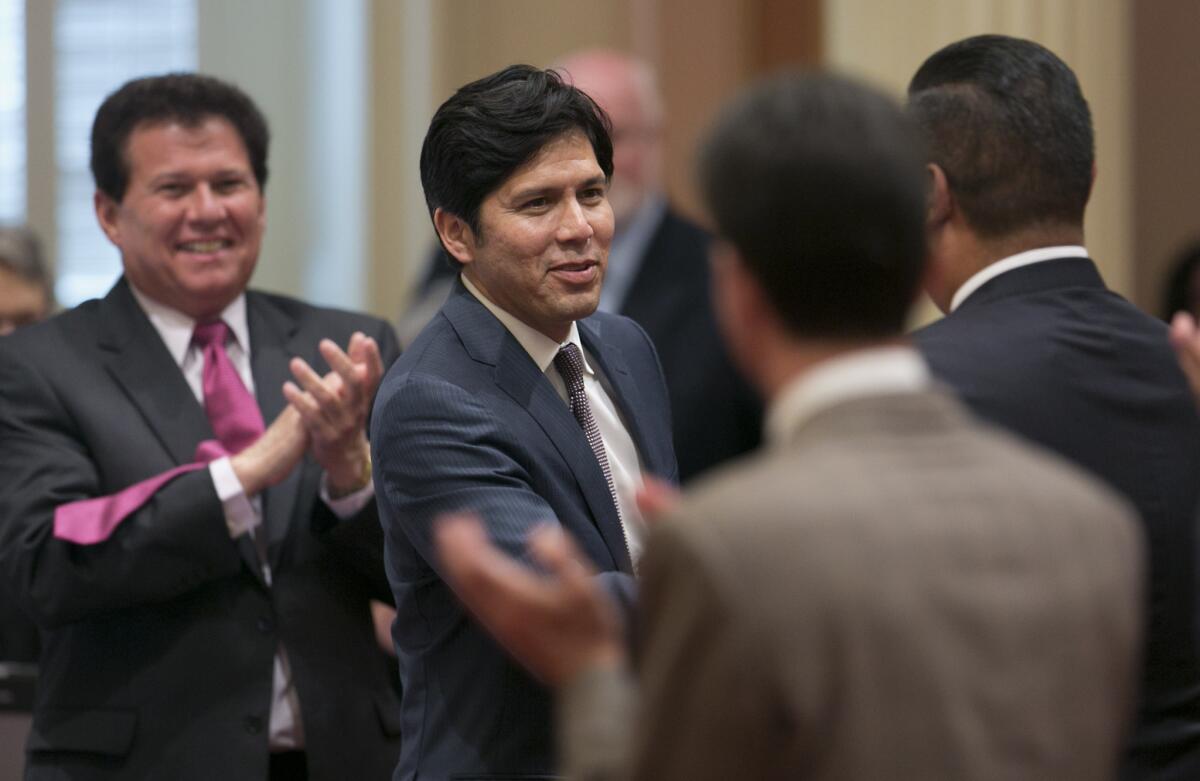New California senators take oath of office; bills introduced

- Share via
Reporting from Sacramento — Ten freshmen took the oath of office Monday to join the California Senate, and a flurry of bills, many of them recycled from last year, were announced on the first day of the two-year session.
Ten returning senators also were sworn in again after their victories in the Nov. 4 election in which Democrats failed to regain their supermajority in both houses.
The new Senate elected Sen. Kevin de Leon (D-Los Angeles) as Senate president pro tem, confirming a vote held in June. He welcomed the new and returning senators, saying he believed cooperation between parties will yield good results for the new session.
“This beautiful building, the Senate Chambers and red carpet belong to the people of the state of California and they have given us a long to-do list to take care of while we’re here,” De Leon told his colleagues. “We must fix our education system so that every kid, regardless of who they are, can attend a great school in their neighborhood and afford to go to college in their own state.”
Afterward, De Leon said he will announce a plan Tuesday that will make the university systems more efficient and effective and negate the need for a 5% annual tuition increase for five years as proposed by the president of the University of California system.
“Janet Napolitano has a lot of moxie for doing what she did, a direct challenge to the executive branch, not to the legislative branch,” De Leon told reporters afterward. “The legislative branch moved forward a proposal to the governor that was vetoed.”
De Leon said there need to be changes that make sure university students graduate in four years, rather than taking longer.
“I think we need better efficiencies in the Cal State system,” De Leon said. “We expect kids to graduate on time. If kids can be incentivized to graduate on time it will open up slots.”
For the UC system, he said “I don’t think its wise to increase tuition five percents. That’s a tax hike as far as I’m concerned on these students that don’t have the financial wherewithal.”
He said the result will be students taking on more jobs and debt.
“We need to figure out how we can eliminate the five percent tuition increase as well as create more slots for the Cal State system that incentivizes kids to graduate on time,” De Leon said.
The ceremony was festive, with family members of new lawmakers serenaded by the group Mariachi Divas.
The new senators are: Benjamin Allen (D-Santa Monica), Patricia Bates (R-Laguna Niguel), Connie Leyva (D-Chino), Mike McGuire (D-San Rafael), Tony Mendoza (D-Artesia), Janet Nguyen (R-Garden Grove), Robert Hertzberg (D-Los Angeles), Dr. Richard Pan (D-Sacramento), Jeff Stone (R-Murrieta) and Bob Wieckowski (D-Fremont).
Monday was the first day for introducing bills for the new session, and several senators announced plans to introduce legislation that failed to win approval last year. The new bills include a measure by Sen. Mark Leno (D-San Francisco) that would raise the minimum wage in California to $11 an hour in 2016, $13 in 2017 and, beginning in 2019, would adjust the minimum wage annually at the rate of inflation.
“Hard-working, full-time employees across California are forced to live in poverty and rely on public assistance just to put food on the table for their families,” Leno said in a statement. “This income inequality crisis, which disproportionately impacts women and children, is detrimental to our communities and the economy. It is time to accelerate the minimum wage and give low-income workers the respect they deserve for a job well done.”
Sen. Ricardo Lara (D-Bell Gardens) reintroduced two bills, one of which would create a new Office of New Americans to help the 2.6 million people in the state illegally get services and special status proposed by the federal government to avoid deportation.
“Ignoring our immigrant communities is irresponsible and unrealistic, especially for a state that has the largest undocumented population in the country” Lara said, adding the new office will provide immigrants with resources, information and fraud prevention assistance, “helping them better integrate into the economic, social and political fabric of our state.”
Lara also reintroduced a proposal to provide healthcare coverage to some of those in the country illegally. The measure would expand state-funded Medi-Cal, and set up a mirror marketplace similar to Covered California, for those not eligible under the federal Affordable Care Act.
“While federal law excludes undocumented immigrants from federal health benefits, including even those granted deferred action under the president’s recent action, California has the ability, the history and the policy to include these Californians in our health coverage and care programs,” said Anthony Wright, executive director of Health Access California, the statewide healthcare consumer advocacy coalition.
Twitter: mcgreevy99
More to Read
Sign up for Essential California
The most important California stories and recommendations in your inbox every morning.
You may occasionally receive promotional content from the Los Angeles Times.











